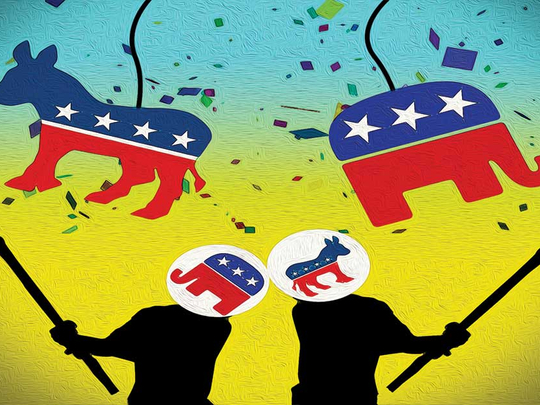
At their convention last week, the Donald Trump Republicans left gaping holes in their case for their ticket. On the third night of the Democrats’ convention in Philadelphia, speaker after speaker drove through those huge gaps, leaving a path for President Barack Obama to flatten the opposition at the end.
These words and arguments may have inspired and electrified the crowd in Philadelphia, but we don’t know how all of it will play with swing voters. We always have to wait for the polls to find out. But if elections were decided based on logical arguments - and we know they are not - then the referee would have stopped this battle somewhere in maybe the first 15 minutes of Obama’s speech.
After yet another afternoon of liberal oratory, the prime-time speakers zeroed in on Trump’s weaknesses. Before Obama, vice-presidential nominee Tim Kaine and Vice President Joe Biden roughed up the Republican nominee. Former New York City Mayor Michael Bloomberg (who is the founder and majority owner of Bloomberg LP, the parent of Bloomberg News) and a retired Navy rear admiral, John Hutson, reached out to audiences beyond typical Democrats.
The speakers went after Trump’s qualifications, his business record, his honesty, his self-regard. Kaine, sounding comfortable in a sort of goofy interpretation of the attack-dog running mate, repeatedly mocked Trump’s “believe me” boast.
The contrasts in language between the two parties’ conventions were striking. The Philadelphia Democrats tended to express their very liberal values in deeply religious language. Trump’s acceptance speech was entirely secular. While the Democrats constantly referred to God and religious values, the Republicans in their references to religion were specific - repealing the “Johnson amendment,” protecting bakeries from having to cater gay weddings. Yet when it comes to the parties’ asymmetry over ideology, Democrats tend to talk about the specifics of issues, while Republicans emphasize broad ideological themes.
Obama, in particular, aimed to make the Trump Republican Party seem small. Or, rather, he magnified the way Republicans made themselves seem small.
Where Republicans - and Trump in particular - defended the police while attacking Black Lives Matter, Obama said that it wasn’t an either-or choice: For Democrats, both groups are valued Americans. Where Republicans saw death and destruction around every corner, Obama was optimistic.
Trump said only he could solve America’s problems. Obama countered that only “we, the people” could do that, not a “home-grown demagogue”:
“Ronald Reagan called America ‘a shining city on a hill.’ Donald Trump calls it ‘a divided crime scene’ that only he can fix. It doesn’t matter to him that illegal immigration and the crime rate are as low as they’ve been in decades, because he’s not offering any real solutions to those issues. He’s just offering slogans, and he’s offering fear. He’s betting that if he scares enough people, he might score just enough votes to win this election.”
In other words, Obama and the other speakers put Trump alone on one side. On the other, they put Hillary Clinton, the Democrats, the groups Trump has sneered at or attacked, and everyone who empathizes with those groups. Numerous anti-Trump Republican writers complained on Twitter that Obama was stealing what Republicans once owned.
But even if Obama did name-check Ronald Reagan and Theodore Roosevelt, he wasn’t stealing anything. He wasn’t claiming ownership of the Declaration of Independence and the Constitution for the Democrats. Instead, he was claiming that American values and democracy were something everyone could share - but that Trump and his allies had walked away from them.
_ Jonathan Bernstein is a Bloomberg View columnist covering U.S. politics.
For more columns from Bloomberg View, visit http: www.bloomberg.com/view.
convention-values-comment









